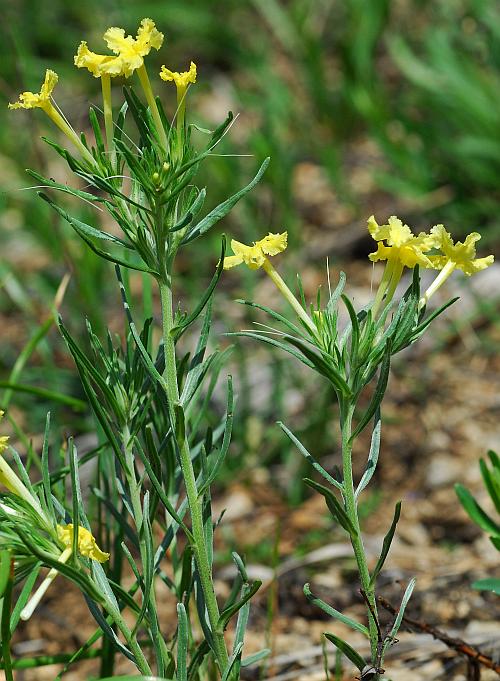Lithospermum incisum Lehm.
Yellow Puccoon

Native
CC = 7
CW = 5
MOC = 37
© SRTurner
Lithospermum incisum Lehm.Yellow Puccoon | |
 |
Native CC = 7 CW = 5 MOC = 37 |
© SRTurner |
|
Family - Boraginaceae Habit - Perennial forb from a stout, woody taproot. Stem - To 40 cm, ascending to erect, sometimes branched, densely pubescent with stiff, antrorse-appressed hairs.
Leaf - 2-7 cm long, 3-6 mm wide, linear to narrowly lanceolate, relatively thick, moderately to densely pubescent with short, stiff, antrorse-appressed hairs, grayish green, without noticeable lateral veins.
Inflorescences - Dense terminal clusters.
Flowers - Calyx actinomorphic, 5-lobed, 6-12 mm long, hairy. Corollas 2.5-4.0 cm long, salverform, yellow, with fringed or corrugated corolla lobes. Corolla tube 15-30 mm long, with stamens inserted near the tip.
Fruits - Nutlets plump, white, shiny, with constricted bases. Said to resemble small teeth. Flowering - April - June. Habitat - Glades, upland and loess hill prairies, tops of bluffs. Origin - Native to North America. Lookalikes - Broadly, other members of the genus. Other info - This attractive species is scattered in Missouri, most often found in counties toward the west-central portion of the state. Its main range comprises a very broad band within the central portion of the continental U.S., also extending into Canada and Mexico. The plant is normally easily recognized by the very long corolla tubes and ruffled lobes. However, there is also a later cleistogamous flowering phase (flowers which are self-pollinated and do not open normally) which is considerably different in appearance. Photographs taken in Danville Conservation Area, Montgomery County, MO, 4-18-2017 (SRTurner). |